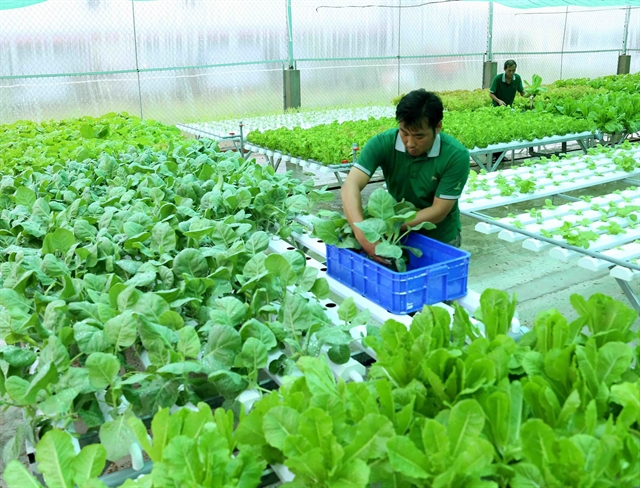 Society
Society

The Cửu Long (Mekong) Delta province of Kiên Giang is taking measures to develop the collective economy in the 2021- 25 period in an aim to improve efficiency and produce high-value products.

|
| Growing organic vegetables at an agriculture co-operative in Kiên Giang Province’s Rạch Giá City. — VNA/VNS Photo Vũ Sinh |
KIÊN GIANG — The Cửu Long (Mekong) Delta province of Kiên Giang is taking measures to develop the collective economy in the 2021-25 period in an aim to improve efficiency and produce high-value products.
The province, the country’s largest rice producer, plans to have 90 collective economy units and co-operatives that use advanced production techniques and have product value chains.
Fifty per cent of its collective economy units and co-operatives will have linkages with companies by 2025.
It aims to have 105 new co-operatives, 560 new co-operative groups and one co-operative alliance by 2025, with 90 per cent of them operating effectively and making profits.
To meet the targets, the province will develop information and legal regulations for the establishment of new co-operatives and co-operative groups and their operations.
The aim is to improve efficiency as well as provide professional skills for more than 6,100 staff members of co-operatives and co-operative groups.
It will offer financial support to these groups to participate in trade fairs, exhibitions and forums at home and abroad, and to register for certificates of product quality, brand names and origin.
Cooperatives operating in agriculture, forestry, fisheries and salt production will build processing and packaging facilities, irrigation works, and in-field roads.
The province has 493 co-operatives operating in various sectors, up 46 against 2019, and 2,109 co-operative groups, down 39 against 2019.
Co-operatives have at least seven members each and co-operative groups at least three members each.
This year Kiên Giang is spending nearly VNĐ30 billion (US$1.3 million) to support the development of the collective economy and new co-operatives, according to the province’s People’s Committee.
The money is being used to provide professional skills to members of co-operatives and co-operative groups, and organise trade promotion activities for them. It is also being used to help them build brand names and origin traceability.
The province’s Steering Committee for Renovation and Development of Collective Economy and Co-Operative will act as a link between companies and co-operatives.
This year the province plans to establish 50 new co-operatives and 10 new co-operative groups with value chains for their products, according to the steering committee. It will focus on new co-operatives and co-operative groups producing rice, sweet potato, vegetable, fruit and seafood.
It will also support the use of good agriculture practices (GAP) standards like VietGAP and Global GAP, and help cooperatives register for VietGAP and Global GAP certificates this year.
GAP standards

|
| No Title |
Under the province’s support policies, localities have developed co-operatives and co-operative groups that produce agricultural products to GAP standards or organic standards.
In U Minh Thượng, an agrarian district, local agricultural co-operatives and co-operative groups have produced organic products since 2018.
Đặng Xuân Thắng, deputy standing secretary of the U Minh Thượng Party Committee, said that agriculture, forestry and aquaculture are the district’s strong advantages, with rice, vegetables, fruit and shrimp the key products.
The district has encouraged farmers to cultivate shrimp-rice, freshwater fish, vegetables and fruits to VietGAP standards. These projects receive investment priority.
The district has set up a concentrated rice farming area, shrimp-rice farming area, and other farming areas for fish - rice farming, freshwater fish, fruit and vegetables.
It has more than 7,250ha of shrimp-rice farming areas, including more than 1,000ha of them with farm contracts that secure outlets and stable prices for farmers.
Many co-operatives and co-operative groups in the district have received certificates of VietGAP, Global Gap or organic standards for their products.
The Minh Dũng Hamlet rice-fish farming co-operative group in Minh Thuận Commune has an organic standard certificate, while the Agricultural Service Co-operative in An Minh Bắc Commune has received a GlobalGAP certificate.
The Kênh 10 Agricultural Service Co-operative in Minh Thuận Commune has a VietGAP certificate for 74ha of vegetables.
The district’s agricultural products planted under GAP and organic standards are guaranteed outlets by co-operatives and companies in and outside the province. — VNS